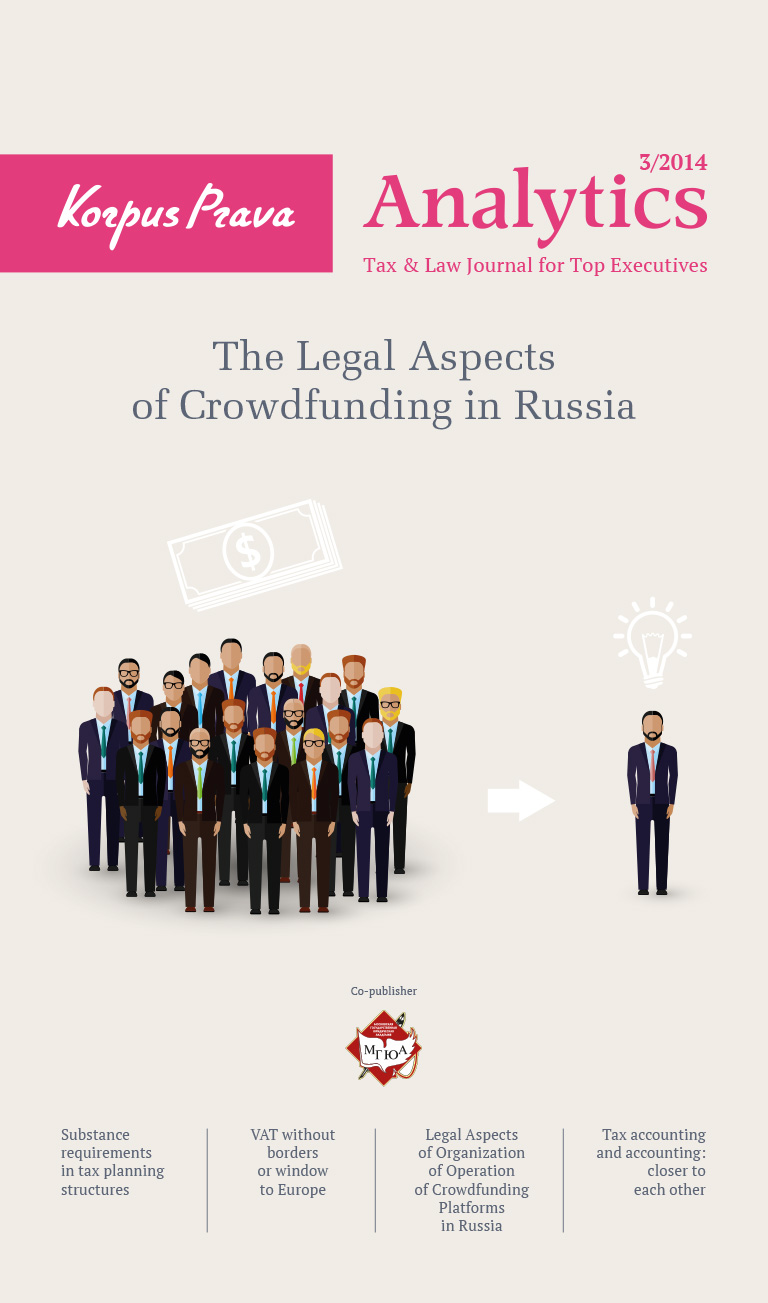- Cyprus Citizenship Scheme for Foreign Investors
- Squeezed But Pleased: Taxation of Passive Income in the European Union
- VAT Without Borders or Window to Europe
- Legal Aspects of Organization of Operation of Crowdfunding Platforms in Russia
- Substance Requirements in Tax Planning Structures
- “Deposit Splitting” of Individuals. Legal Civil and Criminal Aspects
Practical Application of Section V.I of the Tax Code of the Russian Federation: 2017 in Review
Russian courts have finally formed their official opinion on the key issues regarding the application of section V.I of the Tax Code of the Russian Federation. Let us recall that pricing regulation norms for deals between interdependent persons came into force in 2012. In 2015 and 2016, several cases based on pricing regulation norms were already heard by arbitration courts, however, they mainly covered either rights of local tax authorities to apply provisions of transfer legislation when proving unjustified tax advantages, or conditions of qualifying parties as interdependent. But only now, when all transitional provisions and preferential amount limits become invalid, when tax inspections detected wrongdoers which had not filed notices on controlled transactions, and when taxpayers were additionally charged with the profit tax on such transactions, when arbitration court procedures complied enough cases appealing against such judgments, there appeared an opportunity to systemize the legal practice for the most significant law provisions.
The year of 2017 began from a high-profile judgment in the case of a small refining company – Neftyanaya kompaniya Dulisma, CJSC. The Arbitration Court of Moscow passed the actual judgment in case No. А40-123426/2016 back in 2016, but the statement of reasons (consequently, all conclusions of the court hearing) dates January 27, 2017. The case hearing itself was of particular interest, as this case was the first to cover the application of transfer pricing methods. The judge did not even risk of hearing this case sitting alone. The unprecedented decision was to form the collegial body of three judges for the hearing. Besides, it was the tax inspection that initiated the revision of judgment legality, despite the fact that the taxpayer had withdrawn the claim and paid arrears. As a result, this case hearing was actually aimed at forming the legal precedent, and it is likely to be the first time when both tax authorities and the taxpayer were seeking the truth, rather than the case victory. You must agree that this case is truly unique.
Although the judgment in the case of Neftyanaya kompaniya Dulisma, CJSC was not appealed against in supreme bodies, it contains a number of conclusions which should be considered by taxpayers that conduct controlled transactions:
- The Arbitration court confirmed the importance of the detailed execution of the notice on controlled transactions and preparation of transfer documents. In the said case, the taxpayer filed the notice, but did not specify the pricing method which it considered reasonable, and did not submit documents upon the request of the tax authority, therefore, the tax authority was entitled to choose the method and calculation criteria at its own discretion. Should the taxpayer have used the opportunity to specify the method in the notice or documents, the tax authority would have to prove the invalidity of such method, and there are no guarantees that such dispute would have even arisen.
- If taxpayers know that the transaction price corresponds to the market price, they shall ensure obtaining data on such comparable market prices on their own, and in case of failure, they shall choose a different pricing method. The court declined the taxpayer’s arguments that the Federal Tax Service of Russia has to hold data on prices of comparable transactions conducted by small oil companies in the region, and accepted the price quotation according to the specialized analytical agency as the comparable price. By the way, the tax authority actually held and submitted data on prices of comparable transactions, which turned out to be significantly higher than those applied by the taxpayer.
While experts were reviewing every detail of the remarkable judgment, the Supreme Court was getting ready to take matters under control. Thus, in February, it prepared the Review of court hearings of cases regarding the application of particular provisions of section V.1 and article 269 of the Tax Code of the Russian Federation1, which almost set the record straight. Here are some major conclusions made by the supreme judicial authority, which are to be complied with in the near future.
On the right of local tax authorities to control compliance with the regulation on transfer pricing
Pursuant to the general rule, local Federal Tax Service authorities are not entitled to control pricing of any transactions, whether they are controlled or not. The courts’ case implying that tax inspections are entitled to check the accuracy of price application for non-controlled transactions during in-office and on-site tax audit has been deemed illegal.
There is one case when local tax authorities are legally entitled to control the compliance of pricing methods with market pricing guidelines, i.e. when income, profit, revenue shall be estimated based on market prices pursuant to part two of the Tax Code. For that purpose, tax authorities shall apply provisions of section VI.
Although the incompliance of the price set by the taxpayer with the market level bears no evidence of gaining unreasonable tax advantages, the Presidium emphasized that repeated deviation of transaction prices from the market level may be regarded as one of the signs of gaining unreasonable tax advantages combined and interlinked with other circumstances, which revealed discrepancies between the transaction execution and the subject of the business transaction. In other words, such deviation of prices from the market ‘corridor’ is added to the list of reasons which may initiate on-site tax audit and raise doubts about the economic viability of any given transaction.
On the effects interdependent persons have on economic results of controlled transactions
The Presidium also covered the following issue – the effect of interdependency of transaction parties on its results. The judges pointed out that although interdependency of parties leads to strengthening of control over transaction pricing, non-market prices do not always result from interdependency. Thus, a taxpayer that conducted a transaction with an interdependent person under non-market conditions is entitled to prove that it was conducted under other economic circumstances.
Besides, a taxpayer is entitled to justify the non-market price of one transaction by compensating terms of another controlled transaction. Therefore, although the system of compensating adjustments does not work, excess profit under another transaction among interdependent persons may become the reason for its inefficiency under a disputable transaction.
On the independent evaluation as the method of transfer pricing
Judges’ rhetoric shows that the appraiser’s report as the evidence of market value has long lost its importance. The Presidium recalled two cases where expert evaluation is allowed as the major data source on comparable market prices:
- As the major data source used when comparing transaction terms, in case data on comparable transactions conducted by a taxpayer with non-interdependent persons and other data sources specified in clause 1 article 105.6 of the Tax Code are missing or deemed insufficient2.
- Instead of methods of income (profit, revenue) determination set out by chapter 14.3 of the Tax Code, in case a taxpayer conducted a one-off transaction, and the said methods do not allow to determine the price correspondence to the market level3.
It is worth mentioning that upon determining a price of a controlled transaction, taxpayers may not only use an actual method set out by the law, but also the combination of methods or the method at their own discretion, in order to make their case. Therefore, it is reasonable to apply the method of comparable profitability by completing its conclusions with an expert opinion when determining real estate prices upon making controlled purchase and sale or lease transactions.
In June, the legal community livened up again, as the Arbitration Court of Moscow passed the first favorable judgment in the case challenging the controlled transaction price under the provisions of section V.I of the Tax Code. This time round, dispute parties were much more authoritative, thus the case drew more attention. The claimant was Uralkali, PJSC, a large participant in the Russian market and one of the largest taxpayers. By the judgment in case No. А40-29025/17 a different judge of the Moscow Arbitration Court, having no fear of hearing such a significant case sitting alone, fully recalled the decision of the Federal Tax Service on additional charges of lost profit due to the execution of the controlled transaction. This time round, the taxpayer performed all risk-minimizing actions, i.e. filed a notice on controlled transactions, prepared transfer documents and submitted them upon the request of the tax authority. The taxpayer proved that the applied pricing method was the method of comparable profitability, and the transaction party under analysis was a foreign company. Its profitability was compared to the profitability of companies carrying out identical activities abroad.
The pricing method suggested by the taxpayer was deemed compliant with the law, and the judgment was passed in its favor. However, the judgment did not stand in court of appeal, and the Ninth Arbitration Court of Appeal passed a new court order. The superior court decided that the priority pricing method could have been applied to the controlled transaction, i.e. the method of comparable market prices, because required data was available in price quotations of the price information agency Argus Media. It seems that taxpayer’s representatives will find ways to prove their case in the court of cassation. The case is to be heard at the beginning of February, and its result is definitely worth waiting.
- The Review is ratified by the Resolution of the Supreme Court Presidium of the Russian Federation dated 16.02.2017.
- Sub-clause 3, clause 2, article 105.6 of the Tax Code of the Russian Federation.
- Clause 9, article 105.7 of the Tax Code of the Russian Federation.
Your subscription to our journal will definitely boost the efficiency of your specialists and downsize your expenses for consultants.
The journal is available free of charge in the electronic version.
Free Download

